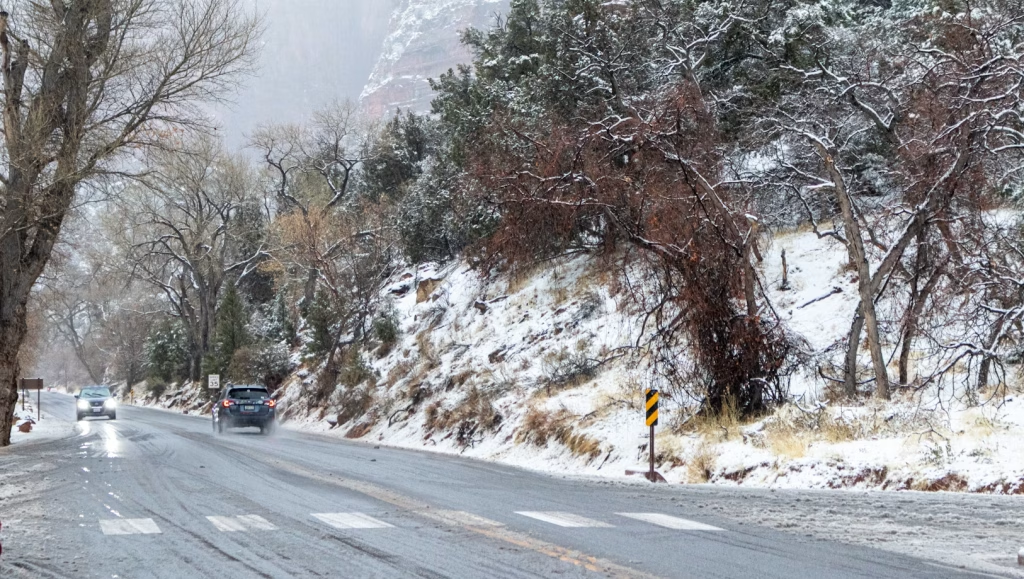Hit By a Driver Who Did Not Prepare for Icy Roads

Colorado winters bring snow, sleet, and icy roads that test even the most experienced drivers. Unfortunately, not everyone takes the time to prepare their vehicles or adjust their driving habits for winter conditions. When that lack of preparation causes a crash, it not just bad luck; it’s negligence. To see why these cases happen so often, it helps to look at the reality of winter driving in Colorado.
Icy Roads and Colorado’s
Winter Driving Reality
From Fort Collins to Colorado Springs, icy road crashes are a common sight each winter. The Colorado Department of Transportation (CDOT) reports that snow and ice contribute to an average of 10,000 crashes each year, often during the morning and evening commute. These collisions can be especially dangerous because:
- Vehicles slide longer distances before stopping.
- Drivers misjudge speed and following distance.
- Poor tire traction leads to spinouts and multi-vehicle crashes.
But while weather is a factor, it doesn’t excuse negligence. Colorado law expects every driver to adjust for conditions; meaning drivers who fail to do so can be held responsible for the damages they cause.
When “Weather” Isn’t an Excuse
Drivers sometimes claim that icy roads made their crash unavoidable. In reality, the law holds drivers accountable for failing to drive safely for the conditions. Drivers must maintain a reasonable and prudent speed for conditions, not just for the posted limit. That means slowing down, increasing following distance, and taking extra care on snow-packed or icy surfaces.
If a driver was speeding, following too closely, or driving on worn tires when they hit you, they can still be found negligent, even if the road was icy. Courts and insurance companies recognize that drivers have a duty of care to operate safely, and that duty doesn’t disappear when it snows.
Common Causes of Icy-Road
Crashes in Colorado
Not every winter accident is the same. Most involve one or more of these avoidable behaviors:
- Driving Too Fast for Conditions: Many drivers assume that if they’re driving below the speed limit, they’re being safe. But “too fast for conditions” means any speed that prevents full control of the vehicle, even 30 mph can be unsafe on black ice.
- Worn or Improper Tires: Colorado Traction & Chain Laws require adequate tire tread or traction devices on certain highways during winter months. Drivers who ignore these traction laws risk both fines and civil liability if their lack of preparation causes a crash.
- Sudden Braking or Oversteering: On ice, abrupt movements cause vehicles to skid or spin. In many cases, a driver’s overreaction (slamming the brakes or jerking the wheel) leads to multi-car pileups or roadway departures.
- Distracted or Impaired Driving: When visibility is poor and traction is limited, distractions and impairment become even more dangerous. Alcohol, fatigue, and mobile-phone use can all turn a minor slide into a serious collision.
- Failing to Clear Ice and Snow: According to Colorado Revised Statute Section 42-4-227 drivers are legally required to keep windshields, mirrors, and lights clear. Snow piled on the roof can also slide forward or blow off, obstructing visibility and creating hazards for others.
In short, winter weather is not a defense — it’s a warning to drive more carefully.
Proving Negligence After a
Winter Weather Crash
If you were hit by a driver who wasn’t prepared for icy roads, proving negligence is key to recovering compensation. A strong case typically includes:
- Police Reports: Colorado crash reports often note road conditions, vehicle speed, and driver actions leading up to the collision. Officers may also cite the at-fault driver for “driving too fast for conditions.”
- Vehicle Condition Evidence: Tire tread depth, maintenance records, and the presence (or absence) of snow tires can all support your claim.
- Weather and Road Data: Your attorney can use CDOT traffic cameras and weather service data to establish that the driver should have anticipated the risk.
- Eyewitness Statements: Other drivers or pedestrians can testify that the at-fault driver was speeding, tailgating, or driving recklessly before the crash.
- Expert Reconstruction: In serious injury cases, accident reconstruction experts analyze skid marks, impact points, and vehicle dynamics to determine exactly how the crash occurred.
The goal is to show that the collision was not an act of nature but the result of human error, a driver’s failure to prepare and adapt to winter conditions.
Types of Injuries from Icy-Road Collisions
Even low-speed crashes on icy roads can cause serious harm because of sudden, unpredictable movements. Common injuries include:
- Whiplash and neck strain
- Back and spinal injuries
- Traumatic brain injuries (including concussions)
- Broken bones and wrist fractures
- Soft-tissue sprains and bruising
Many victims don’t feel pain right away because adrenaline masks the symptoms. Always seek medical evaluation after any winter collision, even if you feel fine at the scene.
Insurance Challenges After a Winter Crash
Insurance adjusters often downplay liability when icy roads are involved, suggesting the crash was “unavoidable.” Don’t accept that explanation. An experienced Colorado car accident lawyer knows how to challenge these defenses by gathering:
- Evidence of unsafe speed or vehicle condition
- Witness statements contradicting the “black ice” excuse
- Photos showing clear visibility or lack of caution
- Records of previous traction or maintenance violations
If an insurance company refuses to negotiate fairly, your attorney can file a lawsuit to hold the negligent driver accountable.
Can Multiple Drivers Be at Fault?
Yes. Multi-vehicle crashes are common during icy conditions. In these situations, Colorado’s comparative negligence law allows recovery even if more than one driver shares fault, if you are less than 50% responsible. Your damages may be reduced by your percentage of fault, but you can still pursue compensation for medical bills, lost wages, and pain and suffering.
How Hoffman Law Firm PC Can Help
At Hoffman Law Firm PC, we’ve handled volumes of Colorado car accident cases involving winter weather and icy conditions. Our attorneys know how to counter the “act of God” defense insurers often use and prove that poor preparation, not the weather, caused the crash.
We will:
- Investigate the crash scene and weather data
- Analyze police and CDOT reports
- Review the at-fault driver’s maintenance and tire records
- Consult experts when necessary to reconstruct the collision
- Handle all communications with insurance companies
We work on a contingency-fee basis, meaning you pay nothing unless we win your case.
Contact Hoffman Law Firm PC Today
Colorado winters can be unpredictable, but responsible driving isn’t optional. If you were injured because another driver failed to prepare for icy roads, you have legal options. Contact Hoffman Law Firm PC today for a free consultation.
Our experienced attorneys can explain your rights, investigate your claim, and pursue full compensation for your injuries.
